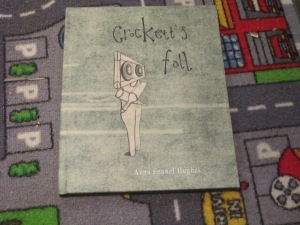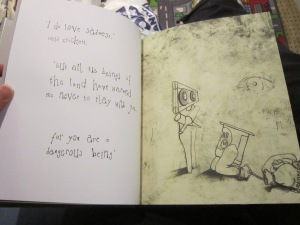Two months ago, I wrote about a wonderful Kickstarter project, Anna Fennel Hughes’ Crockett’s Fall. I am delighted to be able to report back so soon that not only did the project reach its target but the resultant book is an absolute gem (for more details head to Anna’s lovely tumblr).
Crockett’s Fall is a children’s book that tackles the complex issues of power balances and control in childhood friendships. It does so with sensitivity, complexity, and candour – using beautifully terse prose and exquisite, achingly painful illustration. As a thing, this is beautiful, but it is so much more than that. It is a supremely skilful dissection of what it means to be an outsider and then moves beyond that to the very difficult territory of what happens when two outsiders linked by nothing more than their pain hook up.
I had the chance to put these questions to Anna.
- Let me get it out of the way. The whole Radiohead thing. The first thing I thought on seeing the cover was the feel of the wonderful OK Computer album. And the story has something of Paranoid Android. Is that aesthetic an influence at all?
Unfortunately I can’t claim any influence from either of these sources as I hadn’t seen that album cover until you mentioned it and I ‘googled’ it! I have also unfortunately never listened to any of Paranoid Android.
- I should really ask you about the Kickstarter experience. How hard was it? Would you do it again?
The kickstarter campaign was an incredible amount of work. From the day I began considering the idea of embarking on a kickstarter project, I began visiting the site daily. I wanted to work out which projects jumped out at me and why. I needed to know what made a ‘successful’ project. It became clear that for it to be successful you need to be extremely methodical about your approach. Before I had even began the project I needed to have a printed, finished copy of the book to be able to pitch a ‘product’. Even with that out of the way, the kickstarter campaign required a lot of preparation and I was reluctant to get the project off the ground until every single factor had been taken into consideration. As soon as the project starts and the countdown begins, you begin to live in a sort of ‘cyber world’. This is probably the part of the project where I struggled most. My biggest mistake was to not have developed a more extensive ‘media presence’ before the project started. This meant I had to spend most of my days trying to get the project to the people I thought might be interested. It was my first steps into the ‘online social media world’ and I felt like I’d thrown myself in at the deep end. I would wake up a few times during each night to update my emails, to check if anyone new had ‘backed’ me. You do begin to feel completely tied to your phone and laptop. I was constantly refreshing every single tab imaginable. The whole thing is very nerve-wracking; in some ways you feel like the success of it is completely within your hands, while at the same time, you’re relying on the interest and support of people you have never met. The relief when I reached my target was massive. I learned so much throughout the whole experience but most of all for me, about the importance of a media presence. The whole thing was exhausting but incredibly exciting. I would do it again but probably not for quite some time. You really need to commit a few months to the planning and execution of it.
- For such a slender book, there is an incredibly complex dynamic between Crockettt and Poppy. It’s a very insightful examination of the way power shifts in relationships. Could you say something about that dynamic?
Power shifts such as those, which are portrayed through the interactions between Poppy and Crockett, are present in every type of human interaction, I think. When Crockett first encounters Poppy it is he that is pleading with Crockett to spend time with him but as the narrative develops, Crockett becomes completely attached and therefore very vulnerable. The person who ‘needs’ the relationship more is often the more vulnerable one; this ‘need’ can come from a number of sources I think but not uncommonly-various insecurities, which were born before the relationship began. When Crockett and Poppy first encounter each other, Poppy has a weight of sadness to carry. He is desperately trying to shift this. Unfortunately Crockett is later seen in the book now carrying this weight. This vulnerability and insecurity in Crockett means the power suddenly shifts to Poppy. It can make people desperately uncomfortable to acknowledge these power shifts. I think we often don’t allow ourselves to acknowledge them until they have passed.
- I love the texture of the illustrations. There is an incredibly claustrophobic feel to them, especially the fingers that are at once supporting and pulling Crockett down. Was your intention to reflect the deep ambivalence at the heart of such intense friendships?
You’ve hit the nail on the head with your comment about the support and damage of the ‘sea of fingers’. At the very initial stages, when the fingers are introduced, they represent a struggle, the difficulty and space in between where Crockett is and where she knows she should and wants to be. The theme of ambivalence is particularly prevalent at the point where Crockett decides to cross the sea. Poppy, as a good friend encourages her but at the same time helps her in no way. When Crockett begins to struggle, Poppy simply looks on.
The contradictory idea of the sea of fingers both supporting and pulling reflects the nature of the friendship between the two. Crockett and Poppy share a great fondness for one another while at the same time inflicting a great deal of pain. They need each other but we become aware they would be better off without each other.
5. Do you feel a closer connection to the story having been so intimately involved in making it?
I’m not sure if I’d say I feel a ‘closer connection’ as having written the story about an experience in my own life, I don’t think I’ve ever not felt as close as I possibly could to it. I think what I would say though, is that through the development of the images and refining of the narrative, I understood what had happened more and more clearly. I wrote the beginnings of the story about four years ago and when I picked it back up at the beginning of this year, a part of me was tempted to rewrite it, in a kind of more balanced, retrospective way: a less dramatic way. But as soon as I started doing that, I knew it was wrong. I knew that what I had written then was accurate and representative of who I was then and how I thought, it was raw and uninhibited. To re-write it looking back on it would have taken the life and energy out of it. It reminds me of a very different time-the person who wrote it was a very different person. In that way, it’s an interesting way of examining my character and understanding how I allowed myself into certain situations and patterns of thinking. So I feel a closer understanding of who I was, of that person.
6. Poppy and Crockett are both outcasts. Do you think there’s a tendency for those of us who are outsiders to be drawn to others who are outsiders more strongly than we’re drawn to people for other characteristics, and that’s where much of the problems stem from?
I agree with you, there is most definitely a tendency for those of us who feel like ‘outsiders’ to become drawn to ‘outsiders’. I don’t think I believe in the existence of ‘outsiders’ anymore though. I think we are led to believe that we are a mass of people, all less or more capable of conforming to ‘the norm’. Our ability or inability to conform to this ‘norm’ then renders us an ‘outsider’ or not. Unfortunately the people who are most successful in conforming to the expected rules of social behaviour are those who are most capable of hiding the intrinsically unique elements of their character. If everyone were to respond truly and honestly to their instincts and thoughts, all of us would be ‘outsiders’. Depending on to what extent a person is struggling with elements of themselves and looking for similarities in others, they will be more or less willing to sacrifice the search for ‘matched’ characteristics over a need to feel similar to someone else.
I think often our darkest times are when we suddenly realise we exist alone and as an individual in life. At these points when this thought rings most true we feel helpless. Poppy begs Crockett to keep him company, ‘I have a great weight of sadness and no one to share it with’. Everyone is looking for someone who struggles with the same problems and worries. Detecting and realising these worries and thoughts in others helps to ease and comfort this feeling of being ‘alone’. If a person manages to transfer their worries rather than understand them through a relationship, this can indeed be the root of many problems.
7. Going back to the music – it strikes me this would make a beautiful short film with dense, dark musical score. Is that something you’ve considered?
I was extremely lucky to come across Marc Lejeune’s piece, which did a lot of the work In communicating the atmosphere within the book through the animation on the kickstarter page. I put that animation together over the space of about a few days, but I enjoyed it immensely. It occurred to me after that that ‘Crockett’s fall’ really ought to be considered as a moving picture at some point. Back then, I didn’t have time to play around with the idea too much, as kickstarter was looming. Now that the project is more or less winding down, it’s something I’ve begun to look into. In fact just this week I’ve been playing around with animating monoprints digitally. It’s something I’m very keen to take further. There’s a strong possibility I’ll be exhibiting a full length animation of ‘Crockett’s Fall’ next May at my undergraduate degree show.
8. What should I have asked you that I didn’t?
A great number of people have asked me after reading the book, ‘but is it really a children’s book?’ People seem very uneasy with the idea that a children’s book could potentially end unhappily. I think it’s often very unhelpful to categorise something too extensively. Categories are there to help us locate and contextualise but when a category can tell you how a narrative might end that’s when it becomes and unhelpful tool. In the same way, although for children, some of the most successful children’s books appeal most strongly to adults. These are the types of books which we see differently as we get older and gain experiences. Children’s books can often, if executed well, communicate a message in just as many words as are needed.
I suppose the only reason ‘Crockett’s Fall’ falls under the category of a children’s book is because of the length of the narrative and the presence of the illustrations. I think there is more space for growth in the format of narratives and style of illustrations created for children. The likes of Wolf Erlbruch’s ‘Death Duck and the Tulip’ and Jon Klassen’s most recent few books are really pushing the boundaries in this area.






Pingback: She Drew the Gun | dan holloway
Pingback: She Drew the Gun | eight cuts